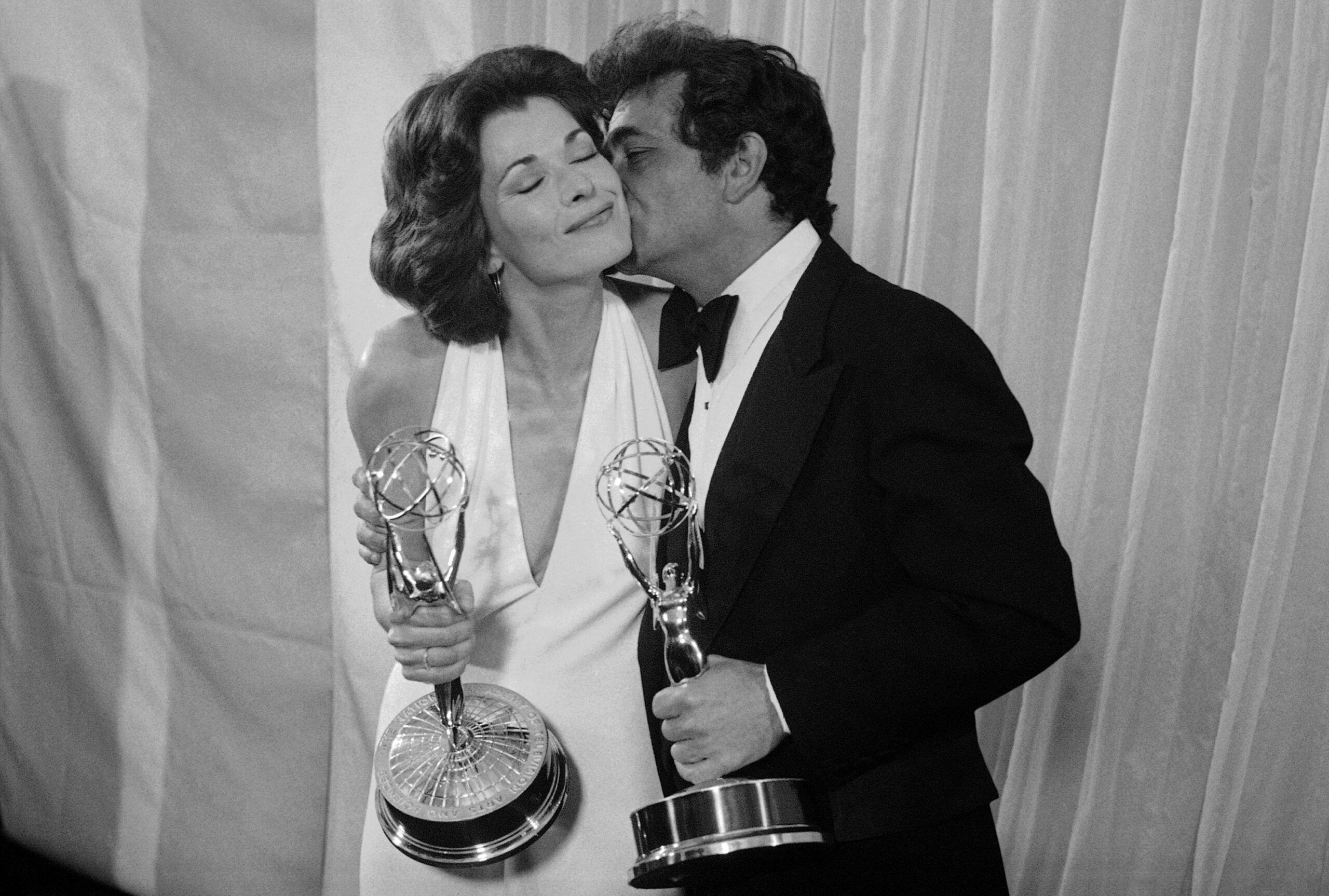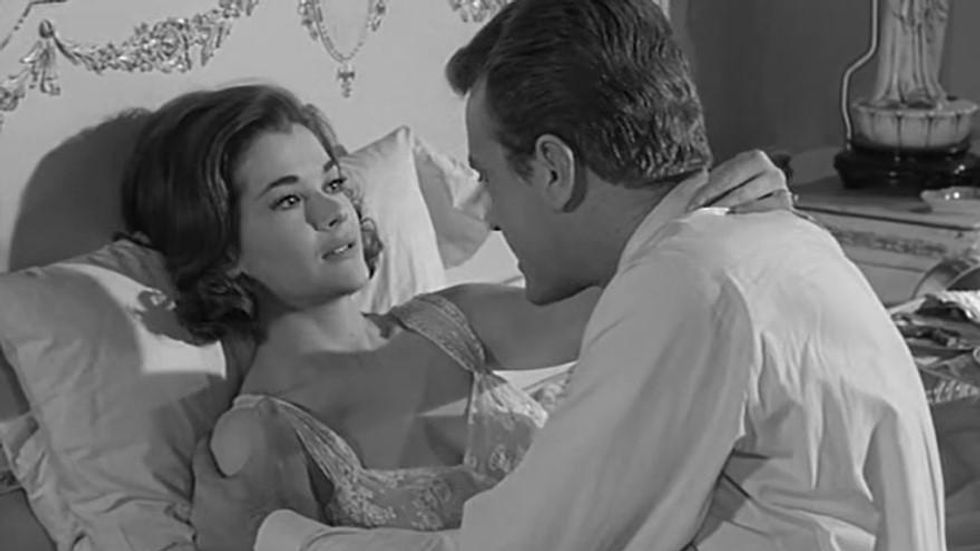
Peter Falk of "Columbo" gives Jessica Walter of "Amy Prentice" a kiss after both won Emmys on May 19, 1975.
Uncredited/AP/Shutterstock
This week, actor Jessica Walter passed away at her Manhattan home.
At 80 years old, Walter had spent most of her entire adult life — nearly 60 years — taking on prominent roles in TV and movies, from Dinosaurs, The Love Boat, and Flipper to The Alfred Hitchcock Story Hour, Clint Eastwood’s Play Misty for Me, and the 1966 classic Grand Prix.
 Jessica Walter on “The Alfred Hitchcock Story Hour” in 1964
Jessica Walter on “The Alfred Hitchcock Story Hour” in 1964
As a young woman, she proved herself a versatile performer, capable of playing a witty paramour, an unhinged stalker, and a loving sitcom mother. But for many fans, Jessica Walter only got better with age.
While Hollywood has a bad habit of discarding its female stars at the first sign of crow’s feet, Waler managed to find a niche that kept her working through her 70s. Exemplified by her Arrested Development character Lucille Bluth, and by Malory Archer — the slightly more vulgar, violent, and business-minded variation from FX’s animated spy comedy, Archer — she transformed herself from a seemingly pleasant, kind person into an heartless and imposing matriarch.
In character, she’s as clever as she is cruel, and so powerfully self-involved that the world sometimes seems to actually revolve around her. It may be strange to think of typecasting as a positive thing for an actor, but when a performer is this good at bringing a role to life, it’s no wonder the part of Malory Archer was written with her in mind.
Now that she has passed, it’s time to look back at some of the lasting contributions Jessica Walter made to the history of television.
The Insults
“Like you’d recognize a vegetable that wasn’t wrapped in a Monte Cristo sandwich.”
“If I wanted something your thumb touched, I’d eat the inside of your ear!”
While the writing staff on Archer and Arrested deserve a lot of credit for coming up with so many creative ways for Jessica Walter to put other people down, the poison in her voice and the ice in her eyes could sell these lines as no one else could.
The Rants
It’s hard to imagine how someone so out-of-touch with reality — “it’s one banana Michael, what could it cost? Ten dollars?” — could have so many passionate opinions about it. And yet, when Jessica Walter got a rant going in character, her commentary carried such force and certainty that you could almost believe that PBS was an evil money laundering scheme.
The Judgment
Nothing could ever be good enough for Jessica Walter’s matriarch. From Malory Archer fat-shaming babies to Lucille Bluth radiating disdain on her first visit to a casual restaurant, she had a way of letting the world know when it didn’t live up to her standards — and it never did.
The Drinking
A hallmark of Walter’s characters on both shows was her constant drinking. She never seemed quite complete without a glass of top-shelf liquor sloshing in one hand. For the most part, the drinking was played off as a functional if excessive habit, perhaps responsible for her super-power of unfiltered speech and lack of self-awareness.
But now and then she played up the drinking for comedic effect — as when Lucille Bluth “mistook the ‘drowsy eye’ alcohol warning” on a bottle of pain pills “for a ‘winking eye’ alcohol suggestion.” In those cases, she could play a sloppy drunk as well as anyone.
The Dominance
No one else was ever the most important person in the room when Jessica Walter was in character as the quintessential HBIC. She had a casual way of lording over the other characters in a scene that could almost make it feel almost normal for Tony Hale to be transporting her tobacco smoke outside in his mouth… Almost.
The “Mothering”
Speaking of her relationship with her children, as Lucille Bluth so succinctly put it, she “no longer [has] the milk of mother’s kindness.” And as Michael Bluth responded, “Yeah, that udder’s been dry for a while though, hasn’t it?”
Whether it’s as Lupe or Woodhouse, she prefers to leave the childcare to someone else while she’s off being a badass.
The Villainy
There’s always been an element of villainy to Walter’s matriarchs, but it was brought to the surface when she played Miss Heinous, AKA Meteora, in Star Vs. the Forces of Evil.
As the tyrannical headmistress of St. Olga’s Reform School for Wayward Princesses, Heinous is pure bad guy, devoted to stamping out individuality while stealing young girls’ life forces and suppressing her own monstrous form. She also rocks out to heavy metal, which is a nice touch.
The Childish Glee
For all her tough exterior, there was one experience that could always reduce Lucille Bluth to a state of child-like glee — Gene Parmesan removing a disguise. A private detective hired to stay on top of various Bluth-family scandals, Parmesan never ceased to amaze Lucille with his ability to suddenly appear in the guise of a janitor, a fireman, a doctor, or a man in a bear suit.
She never seemed to question whether following his clients around in elaborate costumes really helped him with his detective work, but that’s okay, because her reactions were always priceless.
The Class Warfare
No one could play an entitled aristocrat quite like Jessica Walter. Along with the ever-threatened luxury she’s so accustomed to — to the point where she can’t even imagine another way of living — she projects a clear sense that the workers must be kept in their place.
Who else could dig through a housekeeper’s purse to interrogate her about an onion, or strip naked in an elevator to avoid giving her employees a raise?
The Bigotry
Another staple of Walter’s characters is their near-constant allusion to various offensive stereotypes — about Lucille’s Latina employees, and her adopted-Korean son, and Malory’s one and only gay employee. If you wanted to put it gently, you would say that Lucille and Malory were “old school.”
The more honest way to put it would be to say that they’re horrible bigots, but in Malory Archer’s case she’s so old-school that she’s even horribly bigoted against other kinds of white people — particularly the Irish.
The Raw Sexual Energy
Remember how Jessica Walter played lots of sexy characters when she was younger? Well, she didn’t forget how. While her sexuality in character is generally played for laughs (“eww, an old lady likes sex!”) she clearly has a powerful effect on the men in her life — from Archer’s possible fathers who still pine for her, to twin brothers George and Oscar Bluth, to the general who held onto the memory of her touch for 30 years.
And, honestly, it’s entirely believable — as her guest spot on The Big Bang Theory demonstrates.
The Honesty
But for all her talent as an actor bringing unforgettable roles to life, Jessica Walter’s biggest contribution to the television industry came in 2018, when she wasn’t acting at all. Following allegations of sexual harrassment and verbal abuse by Jeffrey Tambor on the set of Transparent, Walter spoke up in a cast interview with The New York Times about her Arrested Development co-star yelling at her on set.
The memory of the incident brought her to tears, but when other male cast members tried to downplay the seriousness of Tambor’s outburst, Alia Shawkat pushed back, but so did Walter, saying of Jason Bateman, “Jason says this happens all the time — in like, almost 60 years of working, I’ve never had anybody yell at me like that on a set.”
The fact that Walter had the strength to stand up for herself at 77, and call out misconduct — even when she was clearly emotional, and the men around her were dismissing her experience — speaks volumes about her character. In addition to all the contributions she made while bringing to life her awful yet hilarious characters as a performer, she should also be remembered for her real-life honesty and bravery.













